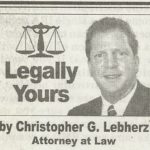Our Blog has moved. Please visit Legally Yours to read the latest law tips that may be relevant to you.
Grandparents’ Visitation Rights
BY CHRISTOPHER LEBHERZ – MAY 24, 2018
When divorce and other circumstances lead to the denial of grandparents’ contact with their grandchildren, grandparents may want to consider taking legal action. While they are not granted a constitutional right to do so, state legislatures have passed statutes granting these rights over the past four decades in recognition of the fact that grandparents play a critical role in the upbringing of children. After meeting the statutory conditions for visitation, grandparents must present the factors that courts may or must consider to grant visitation rights. In every state, grandparents must prove that granting visitation to the grandchild is in the “best interest of the child.” This issue should be carefully considered in consultation with an attorney experienced in family law.
Massachusetts Law:
Section 39D. If the parents of an unmarried minor child are divorced, married but living apart, under a temporary order or judgment of separate support, or if either or both parents are deceased, or if said unmarried minor child was born out of wedlock whose paternity has been adjudicated by a court of competent jurisdiction or whose father has signed an acknowledgement of paternity, and the parents do not reside together, the grandparents of such minor child may be granted reasonable visitation rights to the minor child during his minority by the probate and family court department of the trial court upon a written finding that such visitation rights would be in the best interest of the said minor child; provided, however, that such adjudication of paternity or acknowledgment of paternity shall not be required in order to proceed under this section where maternal grandparents are seeking such visitation rights. No such visitation rights shall be granted if said minor child has been adopted by a person other than a stepparent of such child and any visitation rights granted pursuant to this section prior to such adoption of the said minor child shall be terminated upon such adoption without any further action of the court.
A petition for grandparents visitation authorized under this section shall, where applicable, be filed in the county within the commonwealth in which the divorce or separate support complaint or the complaint to establish paternity was filed. If the divorce, separate support or paternity judgment was entered without the commonwealth but the child presently resides within the commonwealth, said petition may be filed in the county where the child resides.
To schedule a free consultation, please call LEBHERZ & LEBHERZ, Attorneys at Law, at (508) 548-6600 to make an appointment. Our office is at Old Bailey Court, 99 Town Hall Square.
Making Your Claim
 When evaluating a workers’ compensation claim, it is important to understand that, in order for a work injury to be compensable, it must “arise out of and in the course of employment.” In order to fully justify a claim and avoid misinterpretation of the circumstances surrounding it, it is best that an injured employee notify his or her employer within a prescribed time after the injury or the onset of the initial symptoms. This notification should be made in writing on a special form. In the event the employer refuses to provide benefits, it is in the worker’s best interests to consult with a lawyer, who can then request a hearing before the state board or commission of workers’ compensation.
When evaluating a workers’ compensation claim, it is important to understand that, in order for a work injury to be compensable, it must “arise out of and in the course of employment.” In order to fully justify a claim and avoid misinterpretation of the circumstances surrounding it, it is best that an injured employee notify his or her employer within a prescribed time after the injury or the onset of the initial symptoms. This notification should be made in writing on a special form. In the event the employer refuses to provide benefits, it is in the worker’s best interests to consult with a lawyer, who can then request a hearing before the state board or commission of workers’ compensation.
—————————————————————————————————————————————–
The Massachusetts Supreme Judicial Court (SJC) has ruled the state’s independent contractor statute does not determine whether a claimant is an employee eligible for workers’ compensation benefits in a case that has led to questions about worker misclassification.
“Worker misclassification is a serious problem, both in our Commonwealth and across the nation,” SJC Chief Justice Ralph Gants wrote in a concurring opinion regarding the case.
This issue has come to light after a recent case involving claimant Ives Camargo, in which she sought review of a decision made by the reviewing board of the Department of Industrial Accidents regarding a claim she made for workers’ compensation benefits.
The board had affirmed the findings of an administrative judge by concluding Camargo was an independent contractor not entitled to workers’ compensation. Its decision was based on the definition of an employee in Massachusetts’ workers’ compensation statute.
The law governing employment relations in this state remains far from uniform.
After Camargo appealed, the case was transferred to the SJC, which upheld the decision that she is an independent contractor not eligible for workers’ compensation.
In the wake of the case, however, Gants called for the Massachusetts Legislature to consider greater uniformity among laws that classify workers. He added that part of the challenge in preventing misclassification is that there is no uniform definition of an employee. Instead, the law defines employees and independent contractors by several different standards depending on the context.
“In 2004, the Massachusetts Legislature took a significant step toward harmonizing these standards, amending the independent contractor statute…so that its presumption in favor of employee status applied not only to the wage and hour laws….but also to the minimum wage and overtime laws,” Gants wrote. “However, the law governing employment relations in this state remains far from uniform.”
For this or any other legal issue, please call LEBHERZ & LEBHERZ, Attorneys at Law, at (508) 548-6600 to schedule a consultation to review the details of your case. We are located at Old Bailey Court, 99 Town Hall Square.
The Real Deal
 When it comes to making the largest purchase in their lives, home buyers should leave nothing to chance. It is important that an attorney who has real estate experience review a real estate contract and provide advice that could help avoid errors, omissions, misinterpretations, or even misrepresentations that could jeopardize a sale or lead to a legal problem. For instance, by making a sales contract not only contingent upon a professional home inspection, but also the full approval of its results, buyers can protect themselves from being faced with an unsatisfactory inspection and an obligation to purchase the property. In addition, it is important that buyers carefully review sellers’ disclosure statements to learn as much as possible about the property.
When it comes to making the largest purchase in their lives, home buyers should leave nothing to chance. It is important that an attorney who has real estate experience review a real estate contract and provide advice that could help avoid errors, omissions, misinterpretations, or even misrepresentations that could jeopardize a sale or lead to a legal problem. For instance, by making a sales contract not only contingent upon a professional home inspection, but also the full approval of its results, buyers can protect themselves from being faced with an unsatisfactory inspection and an obligation to purchase the property. In addition, it is important that buyers carefully review sellers’ disclosure statements to learn as much as possible about the property.
If legal issues arise that your real estate agent can’t answer, you’ll need an attorney’s help. Although good agents know a lot about the negotiating and contracting part of the process, they can’t make judgments on legal questions. For example, what if your prospective new home has an illegal in-law unit with an existing tenant whom you want to evict in order to rent the place to a friend? Only a lawyer can tell you with any certainty whether your plans are feasible. For this or any other legal issue, please call LEBHERZ & LEBHERZ, Attorneys at Law, at (508) 548-6600 to schedule a consultation to review the details of your case. We are located at Old Bailey Court, 99 Town Hall Square.
Holding Children to a Reasonable Standard – by Christopher Lebherz
 When a child commits a negligent act that leads to significant injury or property damage, some may wonder if the child can be held to the same legal standard that applies to adults. When differentiating an accident from a negligent act, adults are held to a “standard of care” that is required in a given situation. That is, if a person acts in a manner other than how a “reasonable person” would act in the same situation, the individual would be held liable for any resultant injuries. However, children are not expected to act as a reasonable adult would act. Instead, a child’s actions are compared with the conduct of other children of the same age, experience, and intelligence.
When a child commits a negligent act that leads to significant injury or property damage, some may wonder if the child can be held to the same legal standard that applies to adults. When differentiating an accident from a negligent act, adults are held to a “standard of care” that is required in a given situation. That is, if a person acts in a manner other than how a “reasonable person” would act in the same situation, the individual would be held liable for any resultant injuries. However, children are not expected to act as a reasonable adult would act. Instead, a child’s actions are compared with the conduct of other children of the same age, experience, and intelligence.
In some jurisdictions, however, courts apply the adult standard of care to children who engage in certain adult activities, such as snowmobiling. If you or a loved one has been injured, it may be the result of another party’s negligence. This means someone failed to act in a reasonable manner and is therefore liable for any injuries that resulted. To schedule a free consultation, please call LEBHERZ & LEBHERZ, Attorneys at Law, at (508) 548-6600 to make an appointment. Our office is at Old Bailey Court, 99 Town Hall Square.
Suing for Malpractice – by Christopher Lebherz
 When a patient has reason to believe that he or she was harmed by a doctor or other medical professional who failed to competently perform his or her medical duties, there may be grounds for filing a medical malpractice lawsuit. To prove such a case, the patient must first establish that a doctor-patient relationship existed. In order to hold the physician liable for medical malpractice, the patient must also show that the doctor deviated from the appropriate medical standard of care. In addition, the patient must show that it is “more likely than not” that the doctor’s incompetence directly caused the injury. Finally, the patient must show that the injury caused by the doctor’s negligence led to specific damages.
When a patient has reason to believe that he or she was harmed by a doctor or other medical professional who failed to competently perform his or her medical duties, there may be grounds for filing a medical malpractice lawsuit. To prove such a case, the patient must first establish that a doctor-patient relationship existed. In order to hold the physician liable for medical malpractice, the patient must also show that the doctor deviated from the appropriate medical standard of care. In addition, the patient must show that it is “more likely than not” that the doctor’s incompetence directly caused the injury. Finally, the patient must show that the injury caused by the doctor’s negligence led to specific damages.
For this or any other legal issue, please call LEBHERZ & LEBHERZ, Attorneys at Law, at (508) 548-6600 to schedule a consultation to review the details of your case. We are located at Old Bailey Court, 99 Town Hall Square. Call us
Starting Your Own Business – by Christopher Lebherz
 Those starting new businesses should know that the simplest form of business is a “sole proprietorship,” which is not a legal entity and simply refers to a person who owns a business and is personally responsible for its debts. While this popular business form is easy and inexpensive to set up, the owner of a sole proprietorship remains personally liable for all the business’s debts. A “corporation” is separate from its owner, which means that, with some exceptions, it is shielded from personal liability. The “limited liability company” (LLC), which is also protected from personal liability, is not required to adhere to corporate formalities such as annual meetings, recording meeting minutes, electing directors, and issuing stock certificates.
Those starting new businesses should know that the simplest form of business is a “sole proprietorship,” which is not a legal entity and simply refers to a person who owns a business and is personally responsible for its debts. While this popular business form is easy and inexpensive to set up, the owner of a sole proprietorship remains personally liable for all the business’s debts. A “corporation” is separate from its owner, which means that, with some exceptions, it is shielded from personal liability. The “limited liability company” (LLC), which is also protected from personal liability, is not required to adhere to corporate formalities such as annual meetings, recording meeting minutes, electing directors, and issuing stock certificates.
For this or any other legal issue, please call LEBHERZ & LEBHERZ, Attorneys at Law, at (508) 548-6600 to make an appointment. Our office is at Old Bailey Court, 99 Town Hall Square.
Contributory Negligence – by Christopher Lebherz
 Would-be plaintiffs in personal injury cases who point to the negligence of others as the cause of their injury might want to examine their own behavior before they initiate legal action. The notion of liability revolves around the simple fact that most accidents happen because someone was careless or negligent. To this carelessness the law applies the basic rule that the person who is less careful than the other involved in an accident must pay damages. However, even careless individuals may not necessarily be liable to someone injured by their carelessness. The concept of “contributory negligence,” which refers to conduct that creates an unreasonable risk to oneself, may be used as a defense to a negligence claim.
Would-be plaintiffs in personal injury cases who point to the negligence of others as the cause of their injury might want to examine their own behavior before they initiate legal action. The notion of liability revolves around the simple fact that most accidents happen because someone was careless or negligent. To this carelessness the law applies the basic rule that the person who is less careful than the other involved in an accident must pay damages. However, even careless individuals may not necessarily be liable to someone injured by their carelessness. The concept of “contributory negligence,” which refers to conduct that creates an unreasonable risk to oneself, may be used as a defense to a negligence claim.
It is very likely that anything and everything will come out at some point in the discovery process. It is imperative that you be honest with your attorney about the facts and documents that may come out. He or she can’t do the best job if you don’t disclose everything. Let LEBHERZ & LEBHERZ, Attorneys at Law handle your case. Call (508) 548-6600 to make an appointment. Our office is at Old Bailey Court, 99 Town Hall Square.
Can The Police Search Your Cell Phone? – by Christopher Lebherz
 The Fourth Amendment to the U.S. Constitution protects citizens and criminal suspects from unreasonable searches of their property and persons. While law enforcement agencies must apply for a search warrant before conducting a search of the person or premise in issue, the “plain view” doctrine permits the search, seizure, and use of evidence obtained without a search warrant when such evidence was plainly perceptible in the course of lawful procedure and the police had probable cause to believe it was incriminating. So, if the police can search any containers in an immediate arrest area, can they also search a cell phone? The Supreme Court says “no,” because, unlike ordinary containers, cell phones contain digital material that is vast and personal.
The Fourth Amendment to the U.S. Constitution protects citizens and criminal suspects from unreasonable searches of their property and persons. While law enforcement agencies must apply for a search warrant before conducting a search of the person or premise in issue, the “plain view” doctrine permits the search, seizure, and use of evidence obtained without a search warrant when such evidence was plainly perceptible in the course of lawful procedure and the police had probable cause to believe it was incriminating. So, if the police can search any containers in an immediate arrest area, can they also search a cell phone? The Supreme Court says “no,” because, unlike ordinary containers, cell phones contain digital material that is vast and personal.
Keep in mind that an officer is permitted to conduct a frisk, in which an individual’s clothing is patted down, if the officer has a reasonable suspicion that the driver or passengers are armed or otherwise pose a threat. The purpose of the frisk is to ensure the officer’s safety; it is not considered a search within the meaning of the Fourth Amendment. For this or any other legal issue, please call LEBHERZ & LEBHERZ, Attorneys at Law, at (508) 548-6600 to make an appointment. Our office is at Old Bailey Court, 99 Town Hall Square.
Establishing Paternity – by Christopher Lebherz
 Because not all families start out in accordance with the traditional sequence of marriage followed by the birth of a child, there are cases that call for a man to establish that he is the father of a child. Contrary to popular belief, “paternity” cannot be established by a man’s name on a child’s birth certificate. The fact is that the mother can list anyone whom she believes or wants to believe is the father on the birth certificate. Nor is a DNA test the only way for a father to establish paternity. With an attorney’s help, paternity can be established through several means, including having an unmarried couple sign a voluntary acknowledgment of paternity or a similar agreement.
Because not all families start out in accordance with the traditional sequence of marriage followed by the birth of a child, there are cases that call for a man to establish that he is the father of a child. Contrary to popular belief, “paternity” cannot be established by a man’s name on a child’s birth certificate. The fact is that the mother can list anyone whom she believes or wants to believe is the father on the birth certificate. Nor is a DNA test the only way for a father to establish paternity. With an attorney’s help, paternity can be established through several means, including having an unmarried couple sign a voluntary acknowledgment of paternity or a similar agreement.
A lawyer can help you with starting a business, tax issues, estate planning, marital issues and so much more. If you have a legal concern, please call LEBHERZ & LEBHERZ, Attorneys at Law, at (508) 548-6600 to schedule a consultation to review the details of your case. We are located at Old Bailey Court, 99 Town Hall Square. Call us.
Think of Your Children – by Christopher Lebherz
 One of the most important aspects of drawing up a will for parents of young children is appointing a “guardian” to raise the children if both parents were to die before the children reach adult age. While the chances of this scenario taking place may seem to be quite slim, failure to prepare for the eventuality presents possible ramifications that are far too great to dismiss. If a guardian is not named, the judge would appoint a guardian without knowing whom the deceased parent(s) would have preferred. While naming a guardian in a will does not necessarily ensure that the person named to assume this responsibility will be chosen, the judge is quite likely to respect the deceased’s wishes.
One of the most important aspects of drawing up a will for parents of young children is appointing a “guardian” to raise the children if both parents were to die before the children reach adult age. While the chances of this scenario taking place may seem to be quite slim, failure to prepare for the eventuality presents possible ramifications that are far too great to dismiss. If a guardian is not named, the judge would appoint a guardian without knowing whom the deceased parent(s) would have preferred. While naming a guardian in a will does not necessarily ensure that the person named to assume this responsibility will be chosen, the judge is quite likely to respect the deceased’s wishes.
Most TV shows and movies portray lawyers arguing in court. While there are lawyers who are trial attorneys, lawyers do much more than go to trial. A lawyer can help you with starting a business, tax issues, estate planning, marital issues and so much more. If you have a legal concern, please call LEBHERZ & LEBHERZ, Attorneys at Law, at (508) 548-6600 to schedule a consultation to review the details of your case. We are located at Old Bailey Court, 99 Town Hall Square. Call us.
